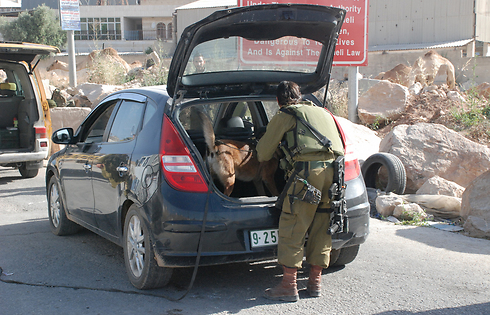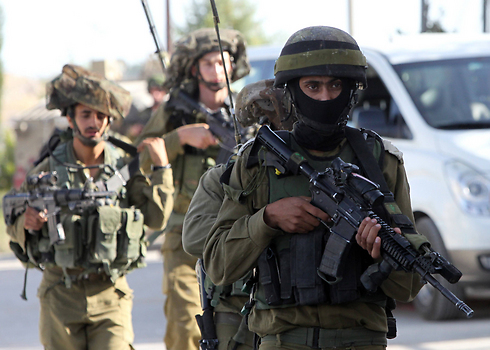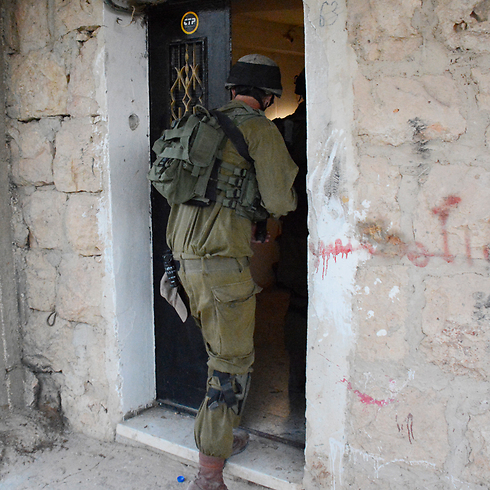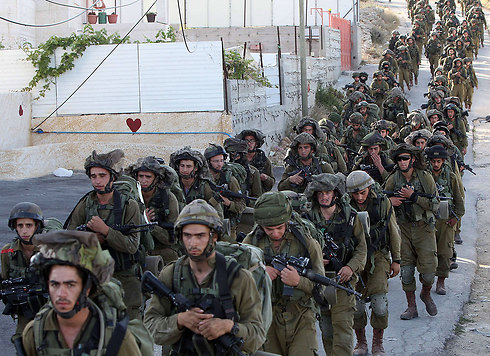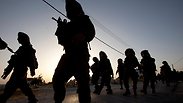
West Bank operation delivers a strategic blow to Hamas
Analysis: While Islamic organization scores points on Palestinian street for kidnapping three Israeli teens, Israel's operation weakens Hamas' presence in the West Bank, thwarting its goal of taking over territories.
Prime Minister Benjamin Netanyahu and Defense Minister Moshe Ya'alon are now doing to Hamas what Egyptian President Abdel Fattah al-Sisi has been doing to the Muslim Brotherhood since July 2013.
Just as al-Sisi worked systematically to prevent a "political revival" of the Muslim Brotherhood in Egypt, so has the Israeli government been working – using the IDF and Shin Bet - to thwart the possibility that Hamas, who is affiliated with the Muslim Brotherhood, takes over the Palestinian street in the West Bank.
Except there's one obvious difference: While Israel is acting systematically and thoroughly against Hamas, it is not doing so with the same brutality and violence al-Sisi used. His style is different, but the objective is the same.
The defense system has been worried radical Islam would leak into Israel and the West Bank for at least two years now.
The first to warn against this threat was the research division of Military Intelligence. The Shin Bet wasn't as worried.
But the fear increased when Palestinian Authority President Mahmoud Abbas and Ismail Haniyeh, until recently Hamas' prime minister in Gaza, announced the signing of a reconciliation agreement.
This increased fear turned into near-panic when it turned out the threat was becoming a reality, when the reconciliation was starting to take shape in the form of a unity government.
The near-panic turned into full-blown hysteria when the ISIS (the Islamic State in Iraq and Syria), which was inspired by Osama bin Laden's teachings, took over northern Iraq.
One could say that Jerusalem today views the danger Israel faces from jihadist radical Islam as almost equal to the danger posed by Iran's military nuclear program.
The teens' kidnapping allowed the leadership in Jerusalem do what they were thinking of doing anyway.
The kidnapping may have won Hamas some credit on the Palestinian street, but this is only a short-term achievement. In the long term, Hamas may lose the chance to achieve its strategic goal - a political and physical takeover of the Palestinian street, particularly in the West Bank, as it already has Gaza.
It should be clear to both the citizens of Israel and the Palestinians in the West Bank that the operation against Hamas, which spread overnight to Nablus, the nearby refugee camps and the Bethlehem area, was not meant to bring the kidnapped teens' release, but to thwart a Hamas takeover of the Palestinian Authority and the PLO.
The Hamas computers that were seized in Bethlehem on Monday night don't have even the faintest of links to the kidnapped boys, but they hold information that aides Israel, and indirectly the PA as well, in destroying the "Dawah" - the civic, social and economic activity that is the source of Hamas' power, and the main tool used to recruit militants and bolster support on the Palestinian street.
Even so, this activity could also aide in finding the abducted teens, since it makes the Palestinian population anxious and puts the Hamas leadership in a dilemma: Should they favor the organization's long-term political interests and give Israel what it wants, or continue hiding the kidnapped teens and possibly even negotiate for their release, knowing full well that every day that passes by takes them further and further away from the chance of becoming the dominant Palestinian faction? The kidnapping could bring an end to Hamas, exactly as ousted Egyptian president Mohammed Morsi and his men's zeal brought an end to the Muslim Brotherhood.
There's one condition, however, to successfully stopping a Hamas takeover of the West Bank - Israel must not lose international support for its operations against Hamas in the territories.
This support has several sources. The world views the very nature of kidnapping teens as an act of terror. In addition, this support stems from the US and Europe's anxiety and loathing of the cruelty of the ISIS in Iraq, Syria and recently in Nigeria, Kenya, Somalia and other places.
The Western world and Eastern Europe are starting to realize that jihadist Islam is soaring and endangering them, both physically and culturally, just as much as it endangers the regimes in Iraq and Syria.
Israel therefore has permission to act freely to suppress Hamas, so long as the operation doesn't involve blunt violations of human rights – such as collective punishment - or bloodshed.
Another important aspect is that Israel is a member of a coalition of Middle Eastern states that fear radical Islam, suffer from its terrorism and are determined to thwart it. Egypt and Jordan lead the charge against radical Islam. That's why Egypt is now demanding Israel to "show restraint" in its West Bank operation, but makes no demand to stop operations against Hamas. This isn't a coincidence. It's also not a coincidence that Jordan made a similar demand for restraint, but in more feeble language. The Jordanians know better than anyone how dangerous Hamas is, even for them.
But we, the Israelis, mustn't create a situation that would lead Jordan, Egypt and Saudi Arabia to act against us. This might happen if, for example, Israel launches an extensive military operation in Gaza.
In the present situation, when the street dictates moves to the Arab regimes and not the other way around, an extensive operation in Gaza that would result in too many casualties could get Jordanians and Egyptians out on the streets, and then both King Abdullah and al-Sisi would have a hard time carrying on with this silent support for Israel's actions.
Secondary aim - retrieving the kidnapped
After the larger, main operation meant to prevent Hamas' political takeover of the Palestinian territories, the second operation is meant to find the kidnapped teens and bring them home safely.
This operation, it has become clearly evident, is mainly an intelligence operation. While there are large forces in the field, their activity is mostly aimed at collecting intelligence.
The arrests, the searches, the checkpoints and the closures, at the end of the day, are meant to bring forth the "golden intel" that would allow security forces to capture the kidnappers and force them to reveal where they are hiding the abducted teens.
Sending large forces into the field is also meant as contingency for the possibility that the Palestinians take to the streets and start rioting on a large scale as a result of the security forces' intense activity.
Experience from the first intifada shows that large presence of IDF troops on the ground both serves as deterrence and allows the dispersal of riots quickly and without bloodshed.
That's why there are now three and a half IDF brigades on the ground, in addition to engineering and other forces, which are seemingly not directly related to the efforts of finding the kidnapped teens. But they will be called to action if and when the situation escalates for whatever reason. These brigades are also needed to suppress another danger - Jewish nationalistic crimes.
In finding the abducting teens, we must show patience. The kidnappers were skilled and learned the lessons of previously thwarted kidnapping attempts. They also know the hard terrain well and enjoy the support of the population. In addition, they enjoyed the advantage of time - eight hours that allowed them to hide the kidnapped teens - and themselves - well.
All of this gives them an advantage that can only be overcome with Sisyphean, stubborn work that yields results. When? It's hard to tell. It could even take years; we must recognize that as well. We've been in this scenario before, when IDF soldiers Avi Sasportas and Ilan Saadon were kidnapped and murdered.
The kidnappers will be caught eventually, and they might have to confess where they hid the kidnapped teens. Meanwhile, they are being careful and have yet to even start bargaining, because they feel like the IDF is at their heels. A feeling that is probably justified.










